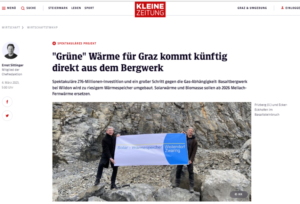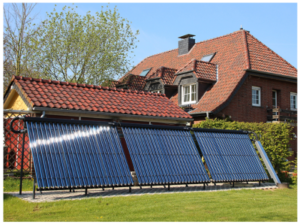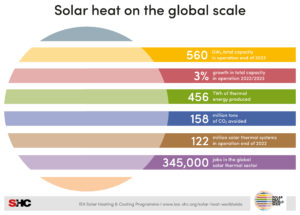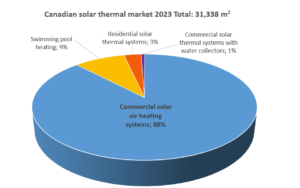

Feasibility studies for large solar heat plants totalling almost 1 million m2 underway
Austria is one of the leading countries in the European Union in the use of renewable energies, ranking fifth with a 36 % share of final energy consumption in the year 2021. Is Austria – like most other EU countries – focusing almost exclusively on renewable electricity generation for decarbonising the national economy or is it also taking into account renewable heat? Roger Hackstock, Managing Director of the Austria Solar association, is critical. “The government has proclaimed a 100 % green electricity target by 2030, which is being worked on rapidly, but there is no such target for heat yet”, he said.
Source: Banner from website https://www.umweltfoerderung.at/
However, as Hackstock acknowledges, the government has allocated EUR 940 million for a “Get out of oil and gas” funding campaign (Rauss aus Öl und Gas – see the banner above) and a building renovation offensive in 2023/2024. While the refurbishment offensive is advancing only slowly, heating system replacement is booming. A total of 46,000 fossil-fuel boilers were replaced last year, twice as many as in 2021. “This is mainly due to the Ukraine war, which has made oil and gas expensive and uncertain”, explained Hackstock. But with 60 % of the heat supply in Austria still being fossil, “Austria is far from 100 % renewable heat”.
27 feasibility studies with an investment volume of EUR 470 million taking place
According to an internal sales survey among the members of Austria Solar, covering about 80 % of the market players, sales of solar thermal collectors in 2022 were 25 % lower than in the previous year. Hackstock therefore sees the Austrian solar thermal market in a state of upheaval: “The market share of small systems in single-family and multi-family homes, which have always dominated, is declining, while large systems for district heating and process heat are catching up. Whereas 93 % of solar thermal systems sold in 2019 were still those for single-family and multi-family homes, in 2021 this was only 79 % according to official market statistics.”
For the years 2023 and 2024 the Austria Solar boss expects strong growth especially for large-scale solar systems thanks to numerous submissions for the Climate and Energy Fund’s support programme. “The great potential of solar heating is shown by the 27 feasibility studies currently underway involving almost 1 million m2 of solar collector area to supply heat to industrial companies and energy suppliers. If all these plants were to be realised in the next few years, this would correspond to an investment volume of EUR 470 million.”
400,000 m2 of collector area to be installed in Graz
The largest project for which the Climate and Energy Fund supported the feasibility study is a EUR 267 million project. In Weitendorf, around 20 km south of Graz, 400,000 m2 of collector area combined with a biomass plant and a gigantic heat storage in a former basalt mine are expected to generate a quarter of the heat required by the Graz district heating network from 2026. The project was featured in a large article in the national newspaper Kleine Zeitung at the beginning of March, stating that the solar heat reservoir is to contain up to 1.9 million m3 of hot water, making it one of Europe’s largest of its kind. This article appeared exactly seven years after the same newspaper reported in April 2016 that the city would receive a Big Solar Graz investment of EUR 200 million. (see news)

Featured article in the Kleine Zeitung about the huge solar district heating plant to reduce the gas-dependency of the city’s heat demand. Screen shot from this page.
However, Austria’s government is continuing to promote smaller solar thermal systems for private households. As early as April 2022, a solar bonus was included in the “Get out of oil and gas” subsidy programme. A house owner installing a solar thermal system in the course of replacing his heating system can receive EUR 1,500. In addition, the government of Styria has doubled its solar subsidy from 150 to 300 EUR/m2 of solar collector area in 2023. This has led to a fourfold increase in applications for subsidies in the first two months of this year. “Beyond that, however, there are no measures from state governments,” Hackstock reported.
A solar thermal system – “prerequisite for receiving housing subsidies”
In his opinion, the most important thing would be the passing of the overdue Renewable Heat Act (EWG), which would lay down a roadmap for the heating replacement of fossil-fuel boilers. “We demand a solar offensive from politicians in new construction and in housing subsidies. The installation of solar systems should be a prerequisite for receiving housing subsidies. A solar offensive should promote the combination with pellet heating systems or heat pumps, as solar heating systems provide the greatest benefit here. They save emissions and biomass resources urgently needed for the heat transition and reduce the electricity demand of heat pumps, which would benefit the expansion of green electricity”.
“Heat is totally underestimated”
But according to Hackstock, as for the awareness of politicians solar heat is lagging behind photovoltaics in the awareness of the population. “The topic of heating is totally underestimated by everyone, although statistically heat is responsible for half of the energy demand in Europe,” he complains. At least he sees a slow change in thinking among company leaders. “They are realising that there is only one alternative to oil and gas for the heat supply that has no running costs: the sun.”
Organisations mentioned in this news article:
Austria Solar: https://www.solarwaerme.at/solare-fernwaerme
Raus aus Öl und Gas (Get out of oil and gas): https://www.oesterreich.gv.at/themen/bauen_wohnen_und_umwelt/energie_sparen/1/raus_aus_oel.html
Sanierungsoffensive (renovation offensive): https://www.oesterreich.gv.at/themen/bauen_wohnen_und_umwelt/energie_sparen/1/sanierungsoffensive.html


